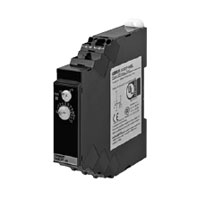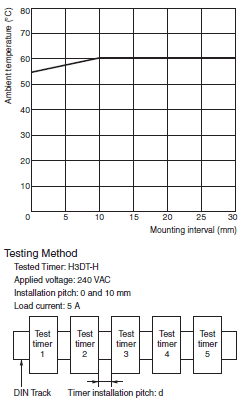| S Series | L Series | |||
|---|---|---|---|---|
| Time range setting | x0.1 | x1 | x1 | x10 |
| Set time range | 0.1 to 1.2 s | 1 to 12 s | 1 to 12 s | 10 to 120 s |
| Power ON time | 0.1 s min. | 0.3 s min. | ||
| Scale numbers | 12 | |||
Power OFF-delay Timer

about this Product Family
last update: October 20, 2016
| S Series | L Series | |||
|---|---|---|---|---|
| Time range setting | x0.1 | x1 | x1 | x10 |
| Set time range | 0.1 to 1.2 s | 1 to 12 s | 1 to 12 s | 10 to 120 s |
| Power ON time | 0.1 s min. | 0.3 s min. | ||
| Scale numbers | 12 | |||
| Supply voltage | H3DT-HCS/-HCL | 100 to 120 VAC, 50/60 Hz |
|---|---|---|
| H3DT-HDS/-HDL | 200 to 240 VAC, 50/60 Hz | |
| H3DT-HBS/-HBL | 24 to 48 VAC/DC, 50/60 Hz *1 | |
| Allowable voltage fluctuation range | 85% to 110% of rated voltage | |
| Power
consumption |
H3DT-HCS | At 120 VAC: 8.7 VA max. |
| H3DT-HCL | At 120 VAC: 8.8 VA max. | |
| H3DT-HDS | At 240 VAC: 21.6 VA max. | |
| H3DT-HDL | At 240 VAC: 21.7 VA max. | |
| H3DT-HBS/-HBL | At 48 VAC: 1.0 VA max., at 24 VDC: 0.4 W max. | |
| Timer operation starting voltage | 30% or less of power supply voltage | |
| Rated Insulation Voltage | 250 VAC | |
| Control output | Contact output, 5 A at 250 VAC with resistive load (cosφ = 1),
5 A at 30 VDC with resistive load Contact materials: Ag-alloy (Recommended fuse: BLN5 (Littelfuse) or 0216005MXEP) |
|
| Ambient operating temperature | -20 to 60°C (with no icing) | |
| Storage temperature | -40 to 70°C (with no icing) | |
| Surrounding air operating humidity | 25% to 85% | |
* DC ripple: 20% max.
| Accuracy of operating
time |
±1% of FS max. (±1% ±10 ms max. at 1.2-s range) | |
|---|---|---|
| Setting error | ±10% of FS ±0.05 s max. | |
| Influence of voltage | ±0.5% of FS max. (±0.5% ±10 ms max. at 1.2-s range) | |
| Influence of
temperature |
±2% of FS max. (±2% ±10 ms max. at 1.2-s range) | |
| Insulation resistance | 100 MΩ min. at 500 VDC | |
| Dielectric strength | Between charged metal part and operating section:
2,900 VAC 50/60 Hz for 1 min. Between control output terminals and operating circuit: 2,000 VAC 50/60 Hz for 1 min. Between contacts not located next to each other: 1,000 VAC 50/60 Hz for 1 min. |
|
| Impulse withstand
test voltage |
Between power supply terminals:
1 kV for 24-VAC/DC and 48-VAC/DC models, 5 kV for all other models. Between conductor terminal and operating section: 7.4 kV |
|
| Noise immunity | Square-wave noise generated by noise simulator
(pulse width: 100 ns/1 μs, 1-ns rise): ±1.5 kV (between power supply terminals) |
|
| Static immunity | Malfunction: 4 kV, Destruction: 8 kV | |
| Vibration
resistance |
Destruction | 0.75-mm single amplitude at 10 to 55 Hz for 2 h each in 3 directions |
| Malfunction | 0.5-mm single amplitude at 10 to 55 Hz for 10 min each in 3 directions | |
| Shock
resistance |
Destruction | 1,000 m/s2 3 times each in 6 directions |
| Malfunction | 100 m/s2 3 times each in 6 directions | |
| Life
expectancy |
Mechanical | 10 million operations min. (under no load at 1,800 operations/h) |
| Electrical | 100,000 operations min.
(5 A at 250 VAC, resistive load at 360 operations/h) |
|
| Degree of protection | IP30 (Terminal block: IP20) | |
| Weight | Approx. 90 g | |
The relation between the ambient temperature and mounting interval is shown in the following graph.
If the Timer is used at 55°C or higher with a mounting interval that is smaller than that shown in the following diagram, the temperature inside the Timer will increase, reducing the life expectancy of internal parts.

| Safety
standards |
cULus: UL 508/CSA C22.2 No. 14
EN 61812-1: Pollution degree 2, Overvoltage category III CCC: Pollution degree 2, Overvoltage category II, section GB 14048.5 LR: Category ENV1.2 DNV GL (Temperature B, Humidity B, Vibration A, EMC A, Enclosure A) |
|---|---|
| EMC | (EMI) EN 61812-1
Radiated Emissions: EN 55011 class B Emission AC Mains: EN 55011 class B Harmonic Current: EN 61000-3-2 Voltage Fluctuations and Flicker: EN 61000-3-3 (EMS) EN 61812-1 Immunity ESD: EN 61000-4-2 Immunity RF-interference: EN 61000-4-3 Immunity Burst: EN 61000-4-4 Immunity Surge: EN 61000-4-5 Immunity Conducted Disturbance: EN 61000-4-6 Immunity Voltage Dip/Interruption: EN 61000-4-11 |
| Input | None | |
|---|---|---|
| Output | Control output | The Timer operates as soon as the Timer is turned ON. The Timer
starts timing when the power is turned OFF and the output is turned OFF when the time set on the dial elapses. |
last update: October 20, 2016